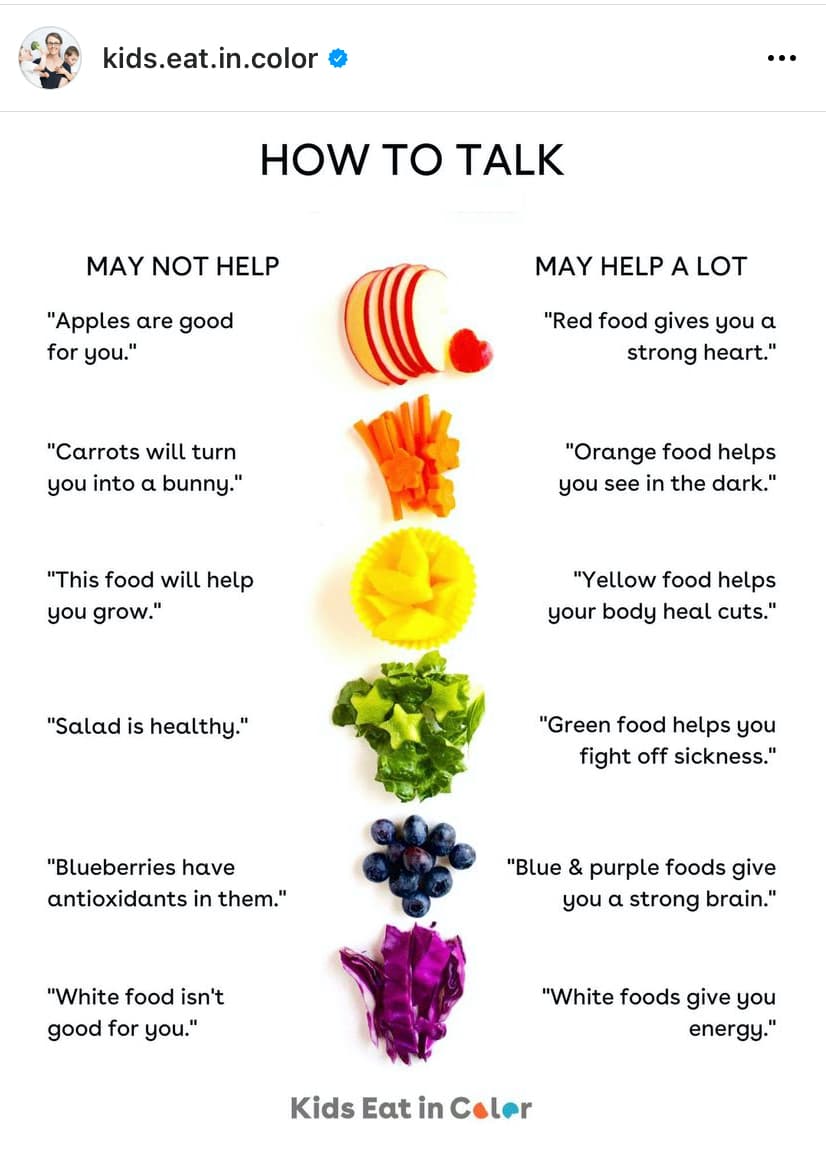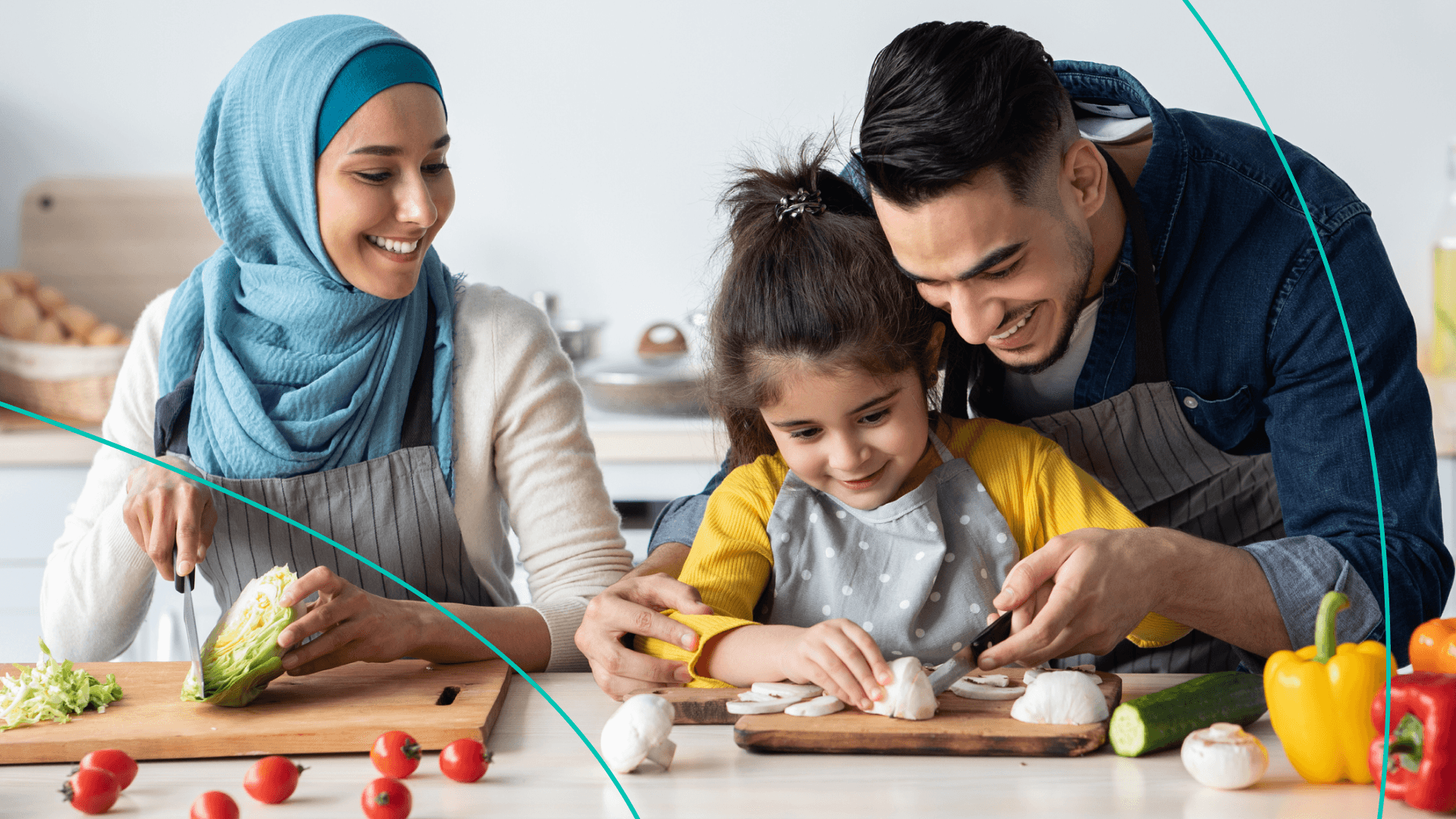So many of us grew up in the era of diet culture. And while Whole30, paleo, and countless other diets are still around, this generation of parents wants something different for their kids. They’re trying to reset and relearn how they relate to food (and talk about it) for the benefit of their kids.
Eating behaviors during the first five years of a kid’s life serve as a foundation for eating patterns later on. And research shows the way parents eat and even talk about food plays a major role in that. Using words like “bad” or “fattening” can create negative associations with food in little ones.
To help us break down how parents can create positive eating experiences for their kids, we spoke to Jennifer Anderson MSPH, RDN, a registered dietitian and founder of Kids Eat in Color.
But first, she shared an important reminder for parents to go easy on themselves: “You're a human. You're not gonna be able to do all the things. Every parent deserves to feel successful today.”
1. Be a positive role model
Kids are like sponges (not just when it comes to food). And what you do will stick with them (yes, just like “Monkey see, monkey do”).
“If you want your child to eat a balanced diet, then you should eat a balanced diet in front of your kid,” said Anderson. Some parents have allergies, food intolerances, or may be picky eaters themselves. It's OK to model eating different foods. Do the best you can.
PS: Anderson recommends that a balanced meal or snack has a protein, an energy source (aka: carbs,) and some color (fruit, vegetable, or both).
2. There are no "bad" or "good" foods
Or “healthy” and “unhealthy” foods. Food is just food. Spinach is spinach, and candy is candy. No need to add a label.
“When we speak badly about food, we are adding an emotional element to eating that kids do not deserve at their young ages,” said Anderson. “So when you say, ‘This piece of birthday cake is bad.’ That child, when they eat it, is thinking, ‘Well then I must be bad’ when they eat it.”
Instead, Anderson said parents should try to draw positive connections by focusing on what the food does for the body. Kids Eat in Color uses the food’s color to help with this. (It’s based on nutritional info and has been simplified for a toddler.)
For example: Try saying, “Red foods help your heart,” or “orange foods help you see in the dark.”

“When you say, ‘This is a watermelon, it's going to help your heart.’ What you've done there is you've created a positive association between foods, and you've given your child a reason to care,” said Anderson. “‘This chicken will help you develop muscle’ is a very interesting thing to a 3-and 4-year-old because they know their muscles are going to help them on the monkey bars. If we're talking about running quickly, [you could say,] ‘Bread is going to give you the energy that you need to run quickly.’”
3. Keep weight out of the convo
Try to stay away from comments about body image or weight. And don’t weigh yourself in front of your kids. A research analysis found that having frequent family meals (more on that below) and avoiding comments about weight could make it less likely for young people to develop eating disorders. And some studies have shown that kids as young as 3 can develop anxieties around body image.
“I don't have any judgment of any parent or anybody who decides that they want to weigh themselves or they care about their body weight or they want to lose weight or gain weight. That's fine,” said Anderson. “But it's not fine for your child. It's not fine for a 3-year-old, for a 4-year-old to be unhappy with their own body at that age.”
4. Don’t pressure your child to eat
Remember when you were little and had to eat every last crumb on your plate at your grandparent’s house? Turns out that forcing kids to eat isn’t helpful. In fact, the AAP recommends parents use “gentle encouragement” instead of “coercive pressure” to get their kids to eat something. For example, you can try asking if your kid wants to try avocados. But if they say “no,” accept that and move on (and try again in the next snack or meal). The study showed that this technique “supports children’s autonomy and self-regulation in eating.” FYI: Those are key factors in developing a positive relationship with food.
“Especially if you have a picky eater, if you're pressuring your child, you're not gonna find success,” said Anderson. “When a parent stops pressuring their child to eat, it just removes so much of the stress. Stop battling your kids to eat that broccoli because it’s just creating drama.”
Plus, they’re more likely to eat the broccoli if you don’t fight them over it. Give them the option to choose if they want to eat it.
Note: Some kids could have feeding problems. If you’re worried your kid isn’t eating enough, talk to your pediatrician.
5. Make it a family affair
Try to involve your kids as much as possible whenever you’re grocery shopping, cooking, eating, or gardening. Research has reinforced the association between cooking together and positive food behavior in kids. And eating together allows you to model eating and introduce a variety of food. Plus, kids in families who eat together are more confident, have better vocabularies, and have higher test scores.
“You're getting that ability to have a connection with your child. You're building positive experiences around the food,” said Anderson. “And I always like to remind parents that they don't have to do it all to still have a really big impact on their kids.”
You may think, “I can barely get dinner made on time without them helping.” It may not be possible for you. Try to share as much with them as you can. Yes, even if that means eating together as a family happens only a few times a week. And it’s OK if it’s take-out.
theSkimm
Diet culture persists, but it doesn’t have to. The way you speak about and interact with food now can help your kids have a healthier relationship with it in the future. It’s OK if you’re still working on your relationship with food (and no one expects you to be perfect). But experts say it’s worth trying these five tips to create positive food experiences for your and your kids.
Live Smarter
Sign up for the Daily Skimm email newsletter. Delivered to your inbox every morning and prepares you for your day in minutes.
